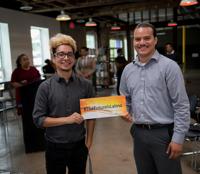Hispanic And Latinx Immigrants Find Uncertain Welcome In Hoosier State
- By Carolina Puga Mendoza, TheStatehouseFile.com.
Obama vs. Trump vs. Biden
The president of the U.S. dictates the path of migration for many people. Each administration has changed policies in some way.
During former President Barack Obama’s administration, the public’s views were split on his approach to immigration. According to Boundless, an educational website about the immigration system, the start of Obama’s presidency resulted in thousands of deportations each year, reaching over 400,000 deportations in 2012. This continued with an average of more than 200,000 deportations up to 2015.
However, his presidency also created the Deferred Action for Childhood Arrivals program (DACA), a policy to secure the children of undocumented immigrants to protect them from deportation and allow them to stay in the country and be able to legally work. DACA is an extension of the Development, Relief and Education for Alien Minors Act (DREAM), which also protects the children of undocumented migrants from deportation.
The administration of former President Donald Trump created chaos in the migrant community, as many people found themselves at risk. According to the Center for Migration Studies, Trump planned the construction and improvement of the border wall, the increasing development of detention facilities for immigrants, limited the access of asylum for refugees, prioritizing deportation for law enforcement, increasing the Immigration and Customs Enforcement (ICE) presence, almost canceling DACA and much more.
Additionally, according to the Migration Policy Institute, the Trump presidency created up to 472 administrative changes affecting immigration policies alone.
President Joe Biden began his presidency in 2021 and to date, his goal has been returning to certain aspects before Trump’s policy changes. Among them, Biden has worked to increase asylum for refugees, protect DACA recipients from deportation, and provide green-card holders use of public services such as Medicaid, according to the Pew Research Center. While his administration is still in its early stages, it’s also trying to ease the path to citizenship for more people.
Before and after: Indiana’s immigration progress to date
Indiana has also changed and adopted migration policies that have negatively and positively impacted immigrants over the past decade.
A notable example, in May 2011, was Indiana Senate Bill 590, which granted police officers permission to ask for proof of legal status under “reasonable suspicion,†according to LegiScan, a national data service. According to an article published by Indiana Public Media, the bill sponsor, Republican Sen. Mike Delph, who was in office from 2005 to 2018, said the bill was inspired by already-existing standards of the U.S. Supreme Court.
“I believe, to most people in Indiana, if you cannot speak the English language and you’re in your 20s, 30s or 40s, you’re probably not lawfully in the country,†Delph said, per the 2011 article.
The fear of being stopped by law enforcement can be seen through Maria Gutierres—a pseudonym for this source who wished to remain anonymous due to safety reasons—who came to the U.S. from Mexico in 1998, pregnant and with a 2-year-old, to look for better opportunities.
Speaking in Spanish, she said “everyday†activities like driving are just not for undocumented workers, and a new life is hard to create under their constant fear. Gutierres said that at first, it was scary to get out of the routine or do basic things such as shopping or traveling for fear that they would be stopped and asked of their legal status.
“Her life is different because here it is pure work. You work, you come home from work and clean the house and go to sleep, and the next day [the same thing],†Gutierres said. “We were also afraid that immigration and all would do something to us, and out of fear sometimes we didn’t leave Indiana.â€
U.S. District Court Judge Sarah Evans Barker blocked parts of SB 590 in 2013. These included the law enforcement section and the request for “consular identification cards,†calling it unconstitutional.Â
In 2021, Rep. Mike Andrade, D-Munster, introduced HB 1318, which would have permitted undocumented residents to get an indication card allowing lawful driving in the state as a way to ease the fear of operating a vehicle regardless of legal status.
“[Immigrants would] feel safer to be able to drive to and from work, to take their kids to school, and still be able to perform their duties and responsibilities and be able to enjoy a quality of life just like everybody else,†Andrade said.
Andrade has been fighting to get this bill started. There is no success at the moment, but that will not stop him from continuing to try, he says. He introduced the bill in January 2021, and it has only had one referral in a committee.
“The last two years, I will look at it and say, ‘Well, have we made progress?’ I will say yes. I can also say no,†Andrade said. “But I’m going to focus on the positive instead of the negative and use that to continue to have momentum.â€
Andrade shared his upbringing as a son of “hardworking migrant parents.†Andrade said that while growing up, he was called slurs such as “burrito†or “Mexican beans.†He was discriminated against for speaking English with an accent.
“The disparity has been there, the challenges have been there, being in a household where your dad had to work two or three jobs just for survival based [on] that we didn’t have something to eat,†Andrade said.
Food insecurity
Driving is just one out of the many concerns policymakers and advocates are currently facing regarding the Hispanic and Latinx communities.
COVID-19 created a lack of access to meals for many people. According to Feeding America, a network of food banks to ease food insecurity for communities, Latinx people are 2.5 times more likely to not have enough food than white people.
Food insecurity is worsened by discrimination based on physical appearance and language as well as cultural barriers, as described by Feeding America. Experts agree that a combination of socioeconomic instability, housing instability and lack of transportation all add up to affect the ability of a person to provide good and balanced meals for their family.
“One obstacle is that it can be hard to get those folks to come to a distribution because they may have fears of what that may mean for them, so we have been trying to break down those barriers,†Jake Bruner, associate director at Hoosier Hills Food Bank, said in a previous story.
Many organizations are attempting to increase food assistance to Latinx households, understanding the language barriers, racial disparity, and fear for governmental organizations.
A survey shows that Hispanics had a 17% poverty rate compared to whites at 8.2%. Lack of a steady paycheck impacts the amount of food a family can afford, limiting each meal for the household.
Housing insecurity
Currently, like many others, housing insecurity has affected the Latinx/Hispanic community. According to a research paper titled “Housing Insecurity Among Latinxs,†the community is one of the most vulnerable, with more than 21% of renters coming from “extremely low incomes.â€
The research suggests that Latinx households are at high risk of losing their homes, given that most of their income goes to paying rent. If the families are already on the poverty line, plus most of their money goes to housing, homelessness increases in likelihood.
Gutierres had mentioned that when she first arrived in the U.S., she and her daughters had to share a home with many other family members. On top of that, to be able to get a place of her own, she had to rely on the generosity of other people. Due to the lack of documents, she had no ID, no Social Security card, and no credit or pay stubs to get a place of her own. That is just an example of the reality for many immigrants.
Lack of access to health care
Health care is also a topic of concern for Latinx because many migrants hold a certain fear of lack of documentation, confusion about eligibility—often due to miscommunication and language barriers—as well as a lack of understanding of the process for health care services, according to the Kaiser Family Foundation, an organization reporting on national health issues.
During COVID-19, Andrade convinced the state health department to stop requesting identification to get the vaccine to encourage more people to get it administered.
Alexis Gonzalez, director of the Indiana Commission on Hispanic/Latino Affairs, said that she understands the fear some individuals might have about trusting government organizations or anyone in a position of power. But she continues to use her background to ease some of that worry and be able to provide the appropriate resources to families.
The commission advocates for lessening the barriers, such as language, people have when accessing their basic human needs.
“[Kids translating documents for parents] happens constantly, all the time, not with just medical but legal and tax documents and everything,†Gonzalez said. “ I like to explain to people that that’s what happens when you don’t have documents in Spanish and English.â€
EducationÂ
Andrade said that education is an ongoing discussion in his office and he advocates to provide equitable access for immigrants, DACA and undocumented students.
According to the National Conference of State Legislatures, Indiana alongside Arizona and Georgia are the only three states that prohibit in-state tuition to undocumented students. According to Rachel Santos, director of education policy at the Indiana Latino Institute, Indiana “goes out of its way†to continue to enforce this policy.
“So imagine how hard it is to be an undocumented student and [to] finish your degree,†Santos said. “If we’re a state that’s saying, ‘We need an educated workforce, we need to grow our workforce,’ this policy is kind of contradicting.â€
Additionally, Santos has worked with students from various backgrounds at many educational levels, and she explains that many educators and schools are not properly prepared to help immigrant students. This means being “culturally competent†or sensitive about the student’s situation and the resources offered to them.
Small business ownersÂ
According to the National Immigration Forum, businesses owned by immigrants have given employment to more than 58,000 workers as of 2016.
The research has also found that Indiana’s workforce is 6.1% immigrants. Sixty-six percent of immigrants work compared to 64% of the native born. This demonstrates the impact and contribution the migrant community has to the state’s overall wellbeing and economic progress.
Andrade said that entrepreneurs must be helped, given that the first three to five years are the most vital for new businesses. People tend to invest most of their savings into a business, and if they’re not supported, it will not prosper.
“Before [the Hispanic community] were the cooks. Now they’re not cooks anymore, they own the Mexican restaurant. Before they were the student … Now they own their own consulting firm,†Andrade said. “And so all this leadership, they’re coming out entrepreneurs, Hispanic entrepreneurs.
“We need to make sure that they have the resources to succeed.â€
Immigrants help increase the state’s economy for the better. In 2018, migrants contributed more than $1 billion in state and local taxes; undocumented migrants contributed $111 million of that.
In 2017, ABC wrote an article on the “Day Without Immigrants,†a day during which all immigrants refrained from going to work or school as a way to highlight the impact they make in the country. It was a response to Trump’s immigration policies. Immigration and economy experts concluded that the U.S. economy would experience a serious economic impact without the help and support of the migrant community.
Employment safety for migrant farmworkers
An often unspoken concern among lawmakers is the quality of the work environment for farmworkers. Jesusa Rivera, a career coach and community organizer, is an advocate for farmworkers and improving their work environment as well as preventing abuse from farm owners.
Rivera said that workers can go unpaid for weeks at a time and be forced to work under poor conditions that jeopardize their health.
“It’s because these guys weren’t documented. People think that they can work for them and not have to pay them because of their lack of documentation, and they use that against them,†Rivera said.
She said that two years ago in La Porte in northern Indiana, a 24-year-old from San Luis Potosi, Mexico, died in a cornfield. Rivera said the farm owner had refused to participate in the free training offered by Proteus, an organization to help agricultural workers.
“Here we are two years later, and no one’s been fined. No one’s been accused … They’re still running through the process of trying to get something done for this family,†Rivera said. “No one should die alone like that.â€
Cases of poor work environments occur in multiple states across the U.S. According to PBS, heatstrokes affected more than 70,000 workers and caused 783 reported deaths between 1992 and 2016.
“The rules are there in the state of Indiana. The law is there, but who’s policing it? If you can’t find enough workers to go out and do an inspection and declare it, you know, unlivable,†Rivera said. “That’s just beyond me.â€
Rivera’s childhood had a fair share of discrimination given that people spoke ill of her siblings and parents. Rivera’s parents came to the U.S. by crossing the Rio Grande. Her family would have to endure rude comments from the farm owners as they needed the job for the money.
“They would call my mom and my dad stupid Mexicans and, you know, we would work so hard for that farmer and yet just the treatment that they would give us,†Rivera said. “You know, I didn’t appreciate when I heard the name calling, especially to my mom … and she’s like, ‘Don’t listen, just keep on working, we need the money.’â€
A step closer to the solutionÂ
Even though Indiana has organizations to advocate for more representation, the growth is slow.
Andrade and Rivera agree that the process to obtain legal status in the U.S. is long and expensive. It can take up to 20 years for some people to attain legal status. Government websites describe a process that can take from a couple of months to a couple of years. However, people who have lived in the country for over 30 years continue to wait for proper documentation to change their legal status.
Indiana is experiencing growth in organizations supporting immigrants’ rights as well as support for the Hispanic/Latinx community. Some organizations include the Indiana Latino Institute, National Alliance for Hispanic Health, Latino Youth Collective and more.
These organizations offer help to learn more about college, funding, food, translation services, legal advice services and more.
Many of the advocates and leaders of the community have a hard time making people understand the challenges of the community, mainly because not everyone will be able to experience the hardships firsthand. What leaders can do is continue to speak up for what they believe with the goal in mind to have equitable access to basic human living.
“My first priority is everyday Latinx Hoosiers in Indiana, … for them being able to see themselves that we are part of the government, we are here, we are seeing, we are being represented, we truly do matter,†Gonzalez said.
“So that’s just one big idea that I want the everyday population to really recognize. And same goes to the legislators, … that the Latinos are prevalent, we’re loud, we’re proud, we’re proud to be here.â€
Closing the gap between the quality of life and fear for migrants, documented or undocumented, will take Indiana to a brighter future, activists like Gonzalez believe.
“I feel that in the future, in the near future, we’re going to be able to start making progress,†Andrade said. “It’s slow, sometimes you don’t see it and it could be discouraging, but once again, you can’t give up.â€
FOOTNOTE: Carolina Puga Mendoza, formerly a reporter for TheStatehouseFile.com, recently graduated from Franklin College’s Pulliam School of Journalism. This report on the challenges Hispanic/Latinx immigrants find in Indiana, was completed as part of her senior project.
The City-County Observer posted this article without bias or editing.





